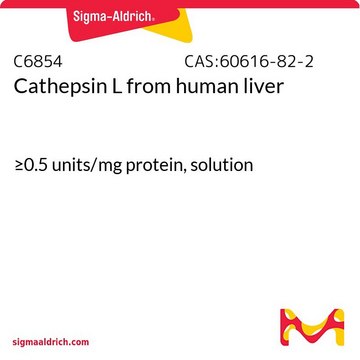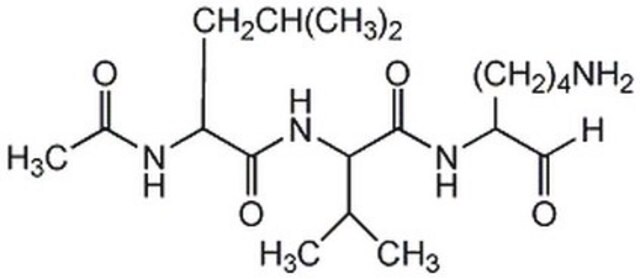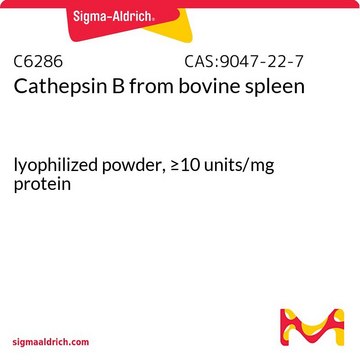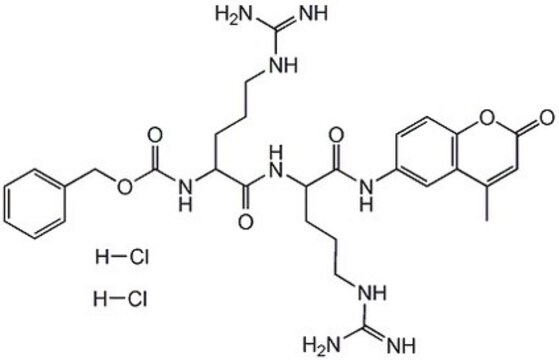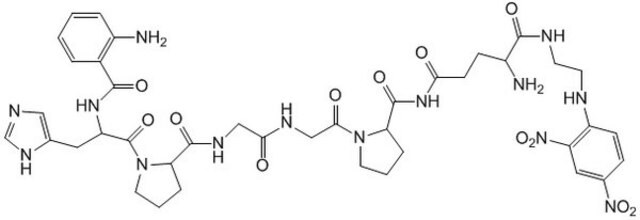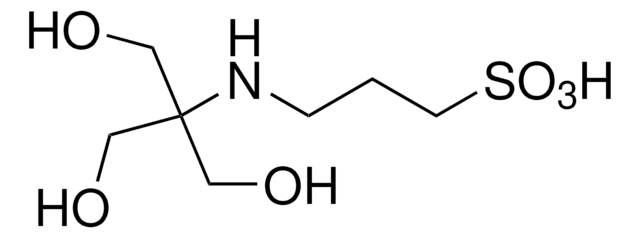219461
Cathepsin K, His•Tag®, Human, Recombinant, E. coli
Cathepsin K, His•Tag, Human, Recombinant, E. coli, CAS 94716-09-3, of the papain superfamily of cysteine proteinases plays a role in osteoclast-mediated bone resorption and collagen degradation.
Autenticatiper visualizzare i prezzi riservati alla tua organizzazione & contrattuali
About This Item
Numero CAS:
Codice UNSPSC:
12352202
NACRES:
NA.77
Prodotti consigliati
Ricombinante
expressed in E. coli
Livello qualitativo
Saggio
≥95% (SDS-PAGE)
Forma fisica
liquid
Attività specifica
≥900 mU/mg protein
Produttore/marchio commerciale
Calbiochem®
Condizioni di stoccaggio
OK to freeze
avoid repeated freeze/thaw cycles
Condizioni di spedizione
wet ice
Temperatura di conservazione
−70°C
Descrizione generale
Cathepsin K is a member of the papain superfamily of cysteine proteinases and plays an important role in osteoclast-mediated bone resorption and collagen degradation. It is primarily expressed by osteoclasts and recent studies also suggest its expression in fibroblasts. Irregularities in cathepsin K activity, either too high or too low, contribute to osteopenic disorders such as osteoporosis and pycnodysostosis. This recombinant enzyme contains a C-terminal His•Tag sequence.
Cathepsin K is a member of the papain superfamily of cysteine proteinases and plays an important role in osteoclast-mediated bone resorption and collagen degradation. It is primarily expressed by osteoclasts. Recently reported to also be expressed in fibroblasts. Irregularities in activity contribute to osteopenic disorders such as osteoporosis and pycnodysostosis. Contains a C-terminal His•Tag.
Note: 1 mU = 1 milliunit.
Confezionamento
Please refer to vial label for lot-specific concentration.
Attenzione
Toxicity: Standard Handling (A)
Definizione di unità
One unit is defined as the amount of enzyme that will hydrolyze 0.4 µmol Z-FR-AMC per min at 37°C, pH 5.5.
Stato fisico
In 50 mM NaOAC, pH 5.5. The activation was stopped by addition of 10 mM MMTS, which can be removed under reducing conditions.
Ricostituzione
Following initial thaw, aliquot and freeze (-70°C).
Altre note
Delaisse, J.M., et al. 2003. Microsc. Res. Tech.61, 504.
Dodds, R.A. 2003. Cell Biochem. Funct.21, 231.
Everts, V., et al. 2003. Calcif. Tissue Int.73, 380.
Hou, W.S., et al. 2003. Biol. Chem.384, 891.
Dodds, R.A. 2003. Cell Biochem. Funct.21, 231.
Everts, V., et al. 2003. Calcif. Tissue Int.73, 380.
Hou, W.S., et al. 2003. Biol. Chem.384, 891.
Note legali
CALBIOCHEM is a registered trademark of Merck KGaA, Darmstadt, Germany
HIS TAG is a registered trademark of Merck KGaA, Darmstadt, Germany
Codice della classe di stoccaggio
12 - Non Combustible Liquids
Classe di pericolosità dell'acqua (WGK)
nwg
Punto d’infiammabilità (°F)
Not applicable
Punto d’infiammabilità (°C)
Not applicable
Certificati d'analisi (COA)
Cerca il Certificati d'analisi (COA) digitando il numero di lotto/batch corrispondente. I numeri di lotto o di batch sono stampati sull'etichetta dei prodotti dopo la parola ‘Lotto’ o ‘Batch’.
Possiedi già questo prodotto?
I documenti relativi ai prodotti acquistati recentemente sono disponibili nell’Archivio dei documenti.
Xiao-Yu Yuan et al.
Bioorganic & medicinal chemistry, 27(6), 1034-1042 (2019-02-19)
Selective proteinase inhibitors have demonstrated utility in the investigation of cartilage degeneration mechanisms and may have clinical use in the management of osteoarthritis. The cysteine protease cathepsin K (CatK) is an attractive target for arthritis therapy. Here we report the
Il team dei nostri ricercatori vanta grande esperienza in tutte le aree della ricerca quali Life Science, scienza dei materiali, sintesi chimica, cromatografia, discipline analitiche, ecc..
Contatta l'Assistenza Tecnica.
